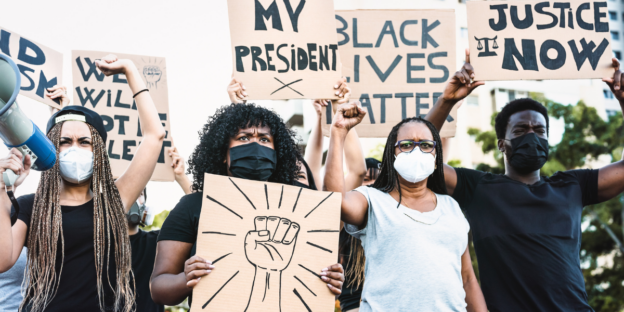
This Lent, Families Deserve Justice
Min. Christian Watkins
March 15, 2023
Readings for the Fourth Sunday of Lent:
1 Sm16:1b, 6-7, 10-13a
Ps 23:1-3a, 3b-4, 5, 6
Ep 5:8-14
Jn 9:1-41
As we journey with our melaninated Messiah towards the cross during this Lenten season, we cannot divorce the struggles he endures from our own. The Gospel reading this Sunday, about light in conflict with the opposing powers of unrelenting darkness, is flanked and colored by vivid images of what that darkness will do — preceded by the attempted stoning of Jesus and followed by the shepherd discourse, with its reference to Jesus’ laying down his life.
When Jesus meets the man born blind, his disciples ask, “Who sinned, this man or his parents?” When the prophet Samuel visits Jesse’s home to anoint one of his sons the future king, he asks, “Are these all the sons you have?” These questions weigh heavily on Black people in the U.S., who are over three times more likely to be killed in an encounter with law enforcement than white people.
The rallying cry of Black Lives Matter pushes back at the racist beliefs that Black people are disposable, criminal, and just as well put out of our poverty and misery through incarceration, or more immediate means. To “being born blind” in Jesus’ day we could add the contemporary construction, “driving while Black.” Both situations presume a guilt that has been carried from generation to generation.
The result is so many dead sons – removed from their homes and families and chosen not for anointing but for death. NETWORK supports the George Floyd Justice in Policing Act, because it offers the modest beginnings of what it will take to pull back the death shroud that killings by law enforcement have cast over communities across the U.S. The ancient hymn proclaims, “Awake, O sleeper, and arise from the dead, and Christ will give you light.”
People in the U.S. who sleepwalk in darkness must awaken to these realities and give light to this suffering, with necessary reforms like body cameras, dashboard cameras, a ban on chokeholds and no-knock warrants, a federal registry of police misconduct complaints, and greater federal and state-level investigatory oversight. These measures offer a glimmer of hope for the transformation our communities desperately need.
As the fruit of Jesus’ vine, we are on display and stand for something Other. If we never find ourselves at odds with the powerful and the status quo, that should give us pause. The blind man, unlike his parents, has the courage again and again to say what he knows, to speak truth to power, to tell what he can about the amazing grace by which he has been touched. This is fundamentally a story about grace, and the blind man sums it up beautifully for all of us: “One thing I do know, that though I was blind, now I see.” To what is God trying to awaken you, to bring to your sight? How will you respond to God’s grace and be the light in someone’s dark situation?
Additional Resources
- Luke Frederick of Georgetown University presents at NETWORK’s 2022 Advocates Training
- Reflection on the 58th anniversary of Bloody Sunday in Selma
- In March 2021, NETWORK celebrated the House passage of the George Floyd Justice in Policing Act
- In May 2022, President Biden signed an Executive Order on Advancing Effective, Accountable Policing and Criminal Justice Practices to Enhance Public Trust and Public Safety (fact sheet)
- Return to Lent 2023







